Organic essential oils have gained popularity for their therapeutic benefits and natural properties. In the article ‘Unlocking the Power of Organic Essential Oils: Finding the Best Brands,’ readers will discover the advantages of using these plant extracts and learn how to select the most reputable brands.
With centuries of traditional use, essential oils offer a range of mental and physical health benefits. By choosing certified organic oils and looking for independent certifications like USDA Organic, individuals can ensure the purity and authenticity of their oils.
Let’s delve into the world of organic essential oils and uncover the top brands that provide quality and purity.
Key Takeaways
- Essential oils have been used for therapeutic and medicinal benefits for thousands of years.
- The quality of essential oils can vary, so it’s important to choose certified organic oils for authenticity and to avoid chemicals.
- USDA Organic certification ensures quality assurance in essential oils.
- Organic essential oils are grown without synthetic fertilizers, pesticides, and GMOs, maintaining their purity and providing maximum benefits.
Understanding the Benefits of Organic Essential Oils
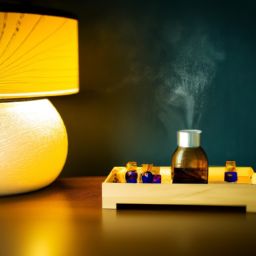
Organic essential oils provide maximum benefits and support sustainable agricultural practices, making them a popular choice for those seeking natural remedies.
The science behind organic essential oils lies in their pure and unadulterated nature. These oils are extracted from plants grown without the use of synthetic fertilizers, pesticides, and GMOs. As a result, they maintain their purity and potency, delivering a wide range of benefits.
One of the notable benefits of using organic essential oils is their effectiveness in skincare routines. These oils possess properties that can nourish and rejuvenate the skin, helping to improve its texture and appearance. They can also address specific skin concerns such as acne, dryness, and signs of aging.
Incorporating organic essential oils into your skincare routine can provide a natural and holistic approach to achieving healthy and radiant skin.
Choosing the Right Organic Essential Oil Brands
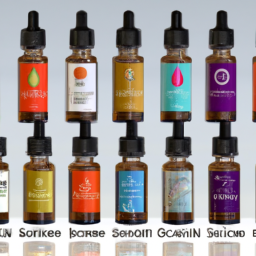
When selecting essential oil brands, it is crucial to consider factors like transparency, third-party testing, and reputation. These factors will help ensure that you are purchasing high-quality organic essential oils that are both safe and effective.
Here are three important things to keep in mind when exploring organic essential oil extraction methods and understanding the difference between organic and conventional essential oils:
Organic essential oil extraction methods: Organic essential oils are extracted using methods that avoid the use of synthetic chemicals and pesticides. Common extraction methods include steam distillation and cold pressing. These methods help preserve the natural properties of the plants and maintain the purity of the oils.
Difference between organic and conventional essential oils: Organic essential oils are derived from plants that have been grown without synthetic fertilizers, pesticides, and GMOs. Conventional essential oils, on the other hand, may contain traces of these chemicals. Organic oils are generally considered to be of higher quality and have a reduced risk of causing skin irritation.
Benefits of organic essential oils: Organic essential oils not only offer potential health benefits but also support sustainable agricultural practices and help preserve biodiversity. They are a natural and environmentally friendly choice for those looking to incorporate essential oils into their daily routines.
The Importance of Pure and Certified Organic Oils
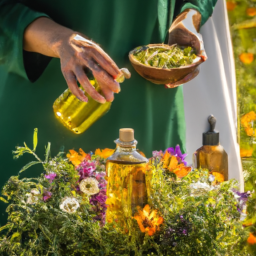
Certified pure oils are crucial for ensuring the quality and authenticity of essential oils. When it comes to organic oils, certifications play a vital role in verifying their authenticity.
Certifications such as USDA Organic provide assurance that the oils have been produced without the use of synthetic fertilizers, pesticides, and GMOs. These certifications ensure that the oils maintain their purity and provide maximum benefits.
On the other hand, using non-organic oils can pose potential risks. Non-organic oils may contain traces of harmful chemicals and pesticides, which can be detrimental to your health.
Exploring the Uses of Organic Essential Oils

Using organic essential oils in aromatherapy, skincare, and cleaning routines can provide a natural and holistic approach to promoting mental and physical well-being. Incorporating organic essential oils into your daily routine can have a positive impact on emotional well-being. Here are three ways organic essential oils can be used:
Aromatherapy: Diffusing organic essential oils can create a calming and soothing environment, reducing stress and anxiety. Oils like lavender, chamomile, and bergamot are known for their relaxation properties.
Skincare: Organic essential oils can be added to your skincare routine to improve the health and appearance of your skin. Oils like tea tree, rosehip, and frankincense have antibacterial and anti-inflammatory properties, helping to combat acne and reduce signs of aging.
Cleaning: Organic essential oils can be used as natural cleaning agents, eliminating the need for harsh chemicals. Oils like lemon, eucalyptus, and peppermint have antimicrobial properties, making them effective in disinfecting surfaces and freshening up your home.
Incorporating organic essential oils into your daily routine can enhance your emotional well-being and improve your overall quality of life.
Factors to Consider When Buying Organic Essential Oils
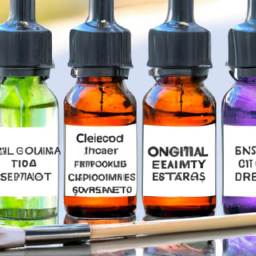
The reputation and reviews of the brand play a crucial role in determining the quality of organic essential oils. When evaluating organic essential oil quality, there are several factors to consider. One of these factors is the extraction method used.
Understanding the different extraction methods for organic essential oils can give insight into the overall quality of the product. The most common methods include steam distillation, cold pressing, and solvent extraction. Steam distillation is the most popular and effective method for extracting essential oils from plants. Cold pressing is typically used for citrus oils, while solvent extraction is used for delicate flowers. Each method has its own advantages and disadvantages, and it is important to research and understand which method was used to extract the oil you are considering purchasing.
Storing and Using Organic Essential Oils Safely
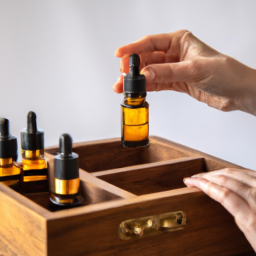
When storing and using organic essential oils, individuals should be mindful of proper storage techniques to maintain their quality and potency. Here are three precautions for using and storing essential oils:
Keep essential oils in dark glass bottles: Exposure to light can degrade the quality of essential oils. Storing them in dark glass bottles helps protect them from light and preserves their potency.
Store essential oils in a cool, dark place: Heat and sunlight can also affect the quality of essential oils. It is best to store them in a cool, dark place, such as a cabinet or drawer.
Keep essential oils out of reach of children and pets: Essential oils are highly concentrated and can be harmful if ingested or applied improperly. It is important to store them safely, out of reach of children and pets.
Top Organic Essential Oil Brands for Quality and Purity
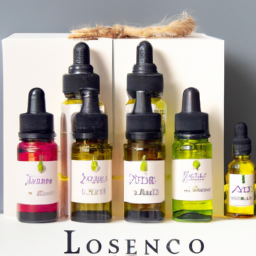
Aura Cacia, doTERRA, Rocky Mountain Oils, Plant Therapy, and Young Living are among the top organic essential oil brands known for their commitment to quality and purity.
When comparing the effectiveness of different organic essential oil brands, it is important to consider the impact of organic farming practices on the quality of the oils. Organic farming practices, such as avoiding synthetic fertilizers, pesticides, and GMOs, contribute to the overall purity and quality of the essential oils. By using organic farming methods, these brands ensure that their oils are free from harmful chemicals and maintain their therapeutic properties.
Additionally, organic farming supports sustainable agricultural practices and helps to preserve biodiversity. When choosing an organic essential oil brand, it is important to consider the brand’s commitment to organic farming practices as it directly affects the quality and effectiveness of the oils.
Frequently Asked Questions
Are Organic Essential Oils More Expensive Than Non-Organic Ones?
Organic essential oils tend to be more expensive than non-organic ones due to the cost comparison between organic and conventional farming practices. Organic farming requires adherence to strict regulations and higher production costs, resulting in a higher price tag.
However, the benefits of organic essential oils make the extra cost worthwhile. Organic oils are grown without synthetic chemicals, ensuring higher quality and purity. They also support sustainable practices and have a positive impact on the environment.
Can Essential Oils Be Ingested for Internal Use?
Essential oils can be ingested for internal use, but it’s important to exercise caution and consult a professional.
For aromatherapy, organic essential oils offer numerous benefits. They are grown without synthetic chemicals, ensuring higher quality and purity.
When used topically for skincare, essential oils can provide various benefits, such as improving skin health and addressing specific concerns. However, it’s crucial to dilute them properly and perform a patch test to avoid skin irritation.
What Are Some Common Side Effects or Risks Associated With Using Organic Essential Oils?
Potential allergic reactions and skin irritation are common side effects associated with using organic essential oils. It’s important to remember that even though organic essential oils are grown without synthetic chemicals, they still contain potent compounds that can cause adverse reactions in some individuals.
It is recommended to perform a patch test before using any new essential oil and to dilute them properly to minimize the risk of skin irritation. If any adverse reactions occur, it’s advised to discontinue use and consult a healthcare professional.
Are There Any Specific Essential Oils That Are Not Recommended for Use During Pregnancy or Breastfeeding?
During pregnancy and breastfeeding, it is important to exercise caution when using essential oils. Some oils can have an impact on hormonal balance and may not be recommended during this time. It is advisable to consult with a healthcare professional before using any essential oils during pregnancy or breastfeeding.
Additionally, essential oils can be beneficial for postpartum recovery. For example, lavender can be used for relaxation, and peppermint can help soothe discomfort. However, it is crucial to use them safely and in moderation.
How Long Do Organic Essential Oils Typically Last Before They Expire or Lose Their Potency?
Organic essential oils typically have a shelf life of about 1-3 years before they start to lose their potency. To properly store organic essential oils and prolong their lifespan, it is important to keep them in a cool, dark place away from direct sunlight and heat.
Additionally, tightly sealing the bottle after each use can help prevent oxidation and maintain the oils’ potency. Following these storage guidelines will ensure that your organic essential oils remain fresh and effective for as long as possible.